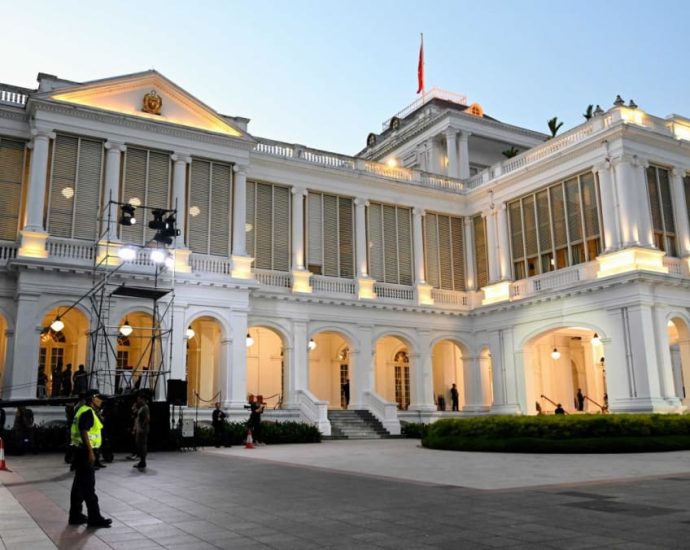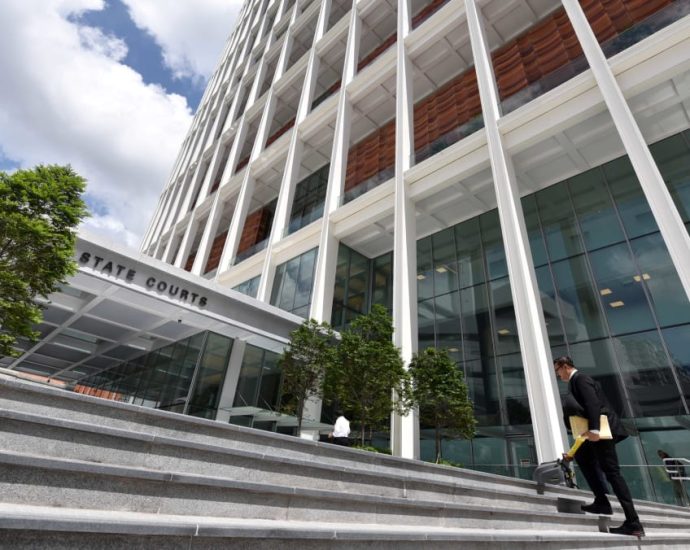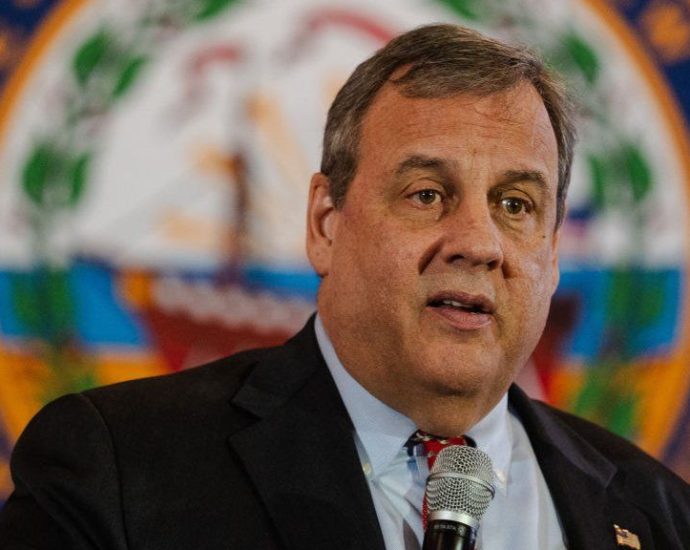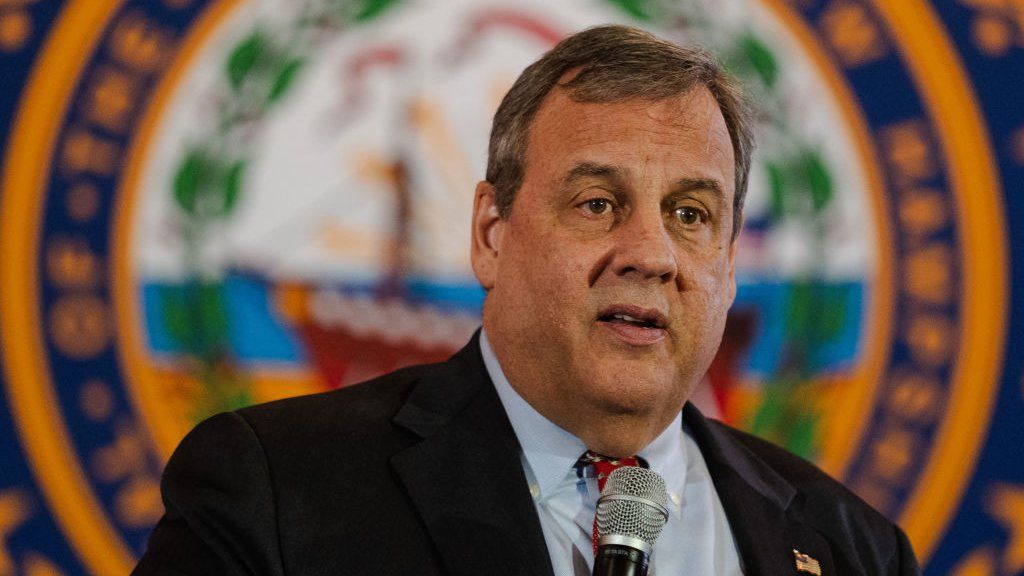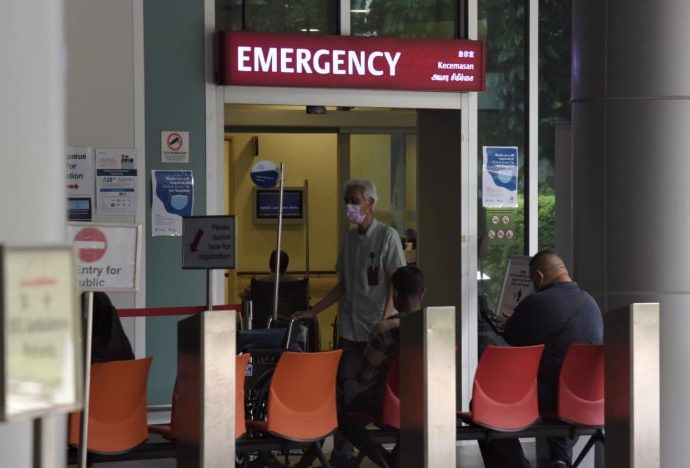‘A bit harsh’, says thief jailed 8 months for stealing from passengers on Scoot flight from Vietnam

SINGAPORE: A man who stole from three passengers during a Scoot flight from Vietnam to Singapore was sentenced to eight months’ jail on Friday (Jan 12) and called the sentence “a bit harsh”.
Zhang Xiuqiang, a 52-year-old Chinese national, pleaded guilty to one count of theft, with another two charges taken into consideration.
The court heard that the incident took place on Scoot flight TR305 from Ho Chi Minh City to Singapore on Dec 16 last year.
The plane had landed in Singapore and the crew were preparing to disembark passengers when a few passengers claimed they had lost money from their carry-on bags.
A 62-year-old South African woman, Ms Graham Valmai Hope, sat in seat 11B, next to Zhang, who was in 11C.
During the flight, Ms Hope saw Zhang walk down the aisle and take a grey bag from the overhead compartment above seat 7E.
Zhang returned to his seat with the bag, removed something from it and placed it in his jacket, before returning the bag.
When the plane landed, Ms Hope noticed that it was a 29-year-old Korean man who retrieved the grey bag Zhang had been rummaging in earlier.
Ms Hope told the Korean man to check the contents of his bag, and the man confirmed that he had lost an envelope containing cash of US$1,000 and S$930 (US$700).
Ms Hope told the victim that it was Zhang who had taken it. At this point, Zhang was not in his seat but was standing along the aisle, waiting to disembark.
Another man, 60-year-old Singaporean Richard Khoo Hye Koon, overheard the conversation and saw Zhang trying to rush to exit.
Mr Khoo stopped Zhang from leaving and saw that Zhang had thrown an envelope on seat 7D.
The victim then took the envelope and counted the cash inside it – it tallied with the amount of money he had lost.
Hearing this commotion, two other passengers also checked their bags and realised the cash was also missing.
One of them lost S$50 and 5.16 million Vietnamese dong (US$210). This amount had previously been reported to be S$50 and 510 million Vietnamese dong based on Zhang’s charge sheet at the time.
The charge sheet has since been amended to reflect the lower value.
The third victim had lost S$600 and 3 million Vietnamese dong.
Another passenger said Zhang had thrown more cash on the floor of the aircraft. He had done this to get rid of evidence, the court heard.
The plane captain requested police assistance and Zhang was arrested. Despite eyewitnesses seeing what he had done, he denied the offences at first.
All the cash belonging to the three victims was recovered.
PROSECUTOR CITES 2013 CASE
Deputy Public Prosecutor R Arvindren sought six to nine months’ jail, saying the sentence imposed must send “an unstinting message to both the accused and other foreigners that Singapore will not tolerate foreigners boarding Singapore-bound flights to commit crimes”.
He cited a case from 2013, when there was a spate of offences committed by Chinese nationals targeting Singapore-controlled aircraft.
According to the judge at the time, the starting point for the jail term regardless of the amount stolen was nine months, said Mr Arvindren.
However, he accepted that this was likely for a scenario where the accused claimed trial and gave an “appropriate sentencing discount” for the term he sought for Zhang.
Mr Arvindren said passengers on a plane cannot be monitoring their belongings at all times. Many passengers sleep on flights or do their own activities, and it “cannot be incumbent on them to be watching their own baggage all the time to ensure nobody else takes them”, said the prosecutor.
Zhang was remanded. He pleaded for leniency for a lighter sentence via a Mandarin interpreter, saying he was remorseful and had returned all the money to the victims.
The judge said these offences are easy to commit but difficult to detect.
“In this case, the accused had actually taken monies, and the only reason why he was not successful in (completing the theft) was because of the vigilance of others, and this is not something that cannot be credited to him,” said District Judge Ong Luan Tze.
Upon hearing the sentence interpreted to him in Mandarin, Zhang exclaimed in Mandarin: “It’s a bit harsh, isn’t it?”
The judge responded that this was her decision and that he can choose what to do next, referring to the possibility of an appeal.
For theft, an offender can be jailed up to three years, fined, or both.
Istana to undergo major restoration works from second half of 2024
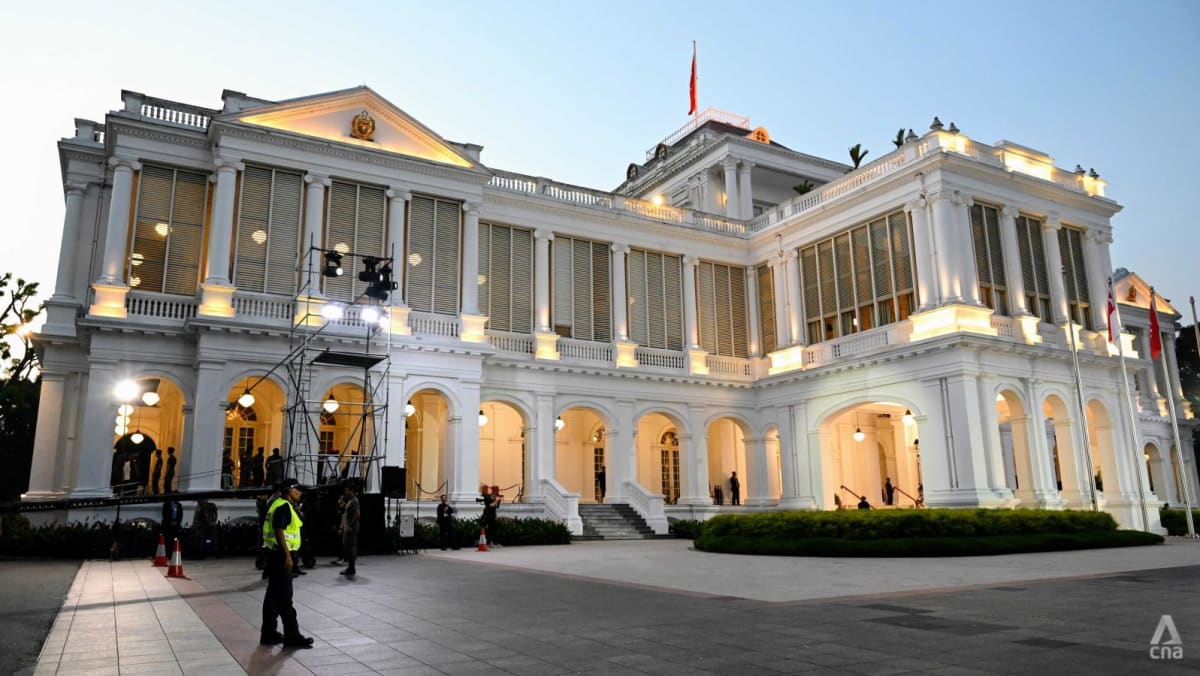
SINGAPORE: The main building of the Istana is scheduled to undergo major restoration works from the second half of 2024 to fix wear and tear issues.
“Restoration works are needed to address deterioration due to environmental factors such as rain and humidity, which have affected the building’s structure and woodwork,” the National Heritage Board (NHB) said on Friday (Jan 12).
“Measures also need to be taken to prevent future moisture retention, restore portions of the structure and overhaul the aged electrical and mechanical systems to achieve better performance and higher energy efficiency.”
The Istana is the official residence of the President of Singapore.
It was built by the British colonial government between 1867 and 1869 to house its governors.
The main building of the Istana was gazetted as a national monument in 1992 and its last significant renovation was in the 1990s.
“It requires periodic specialised restoration and maintenance works to preserve it as a monument that all Singaporeans can be proud of and enjoy, and to maintain its functionality as a working government building and a venue for state and community events,” NHB said.
Plans for restoration were first announced in 2021. Minister for Culture, Community and Youth Edwin Tong told parliament at the time that work would begin in 2023.
He said in an update last March that restoration was expected to begin in early 2024.
NHB said a tender was called on Friday for shortlisted contractors to submit proposals and price bids for the Istana restoration project, adding that the tender is set to be awarded in the second half of 2024.
Coroner rules death of 23-year-old NUS graduate misadventure after he was found dead at foot of condo

SINGAPORE: A coroner’s court has ruled the death of a 23-year-old man a misadventure after he was found dead at the foot of his condominium in August 2022.
Chinese national Zhao Mingjian had barely started working at his new job after graduating from the National University of Singapore (NUS) when he fell from the 15th floor.
His mother raised several concerns during the inquiry and did not believe he had died by suicide. She referred to the purportedly odd comments made by his friends at his funeral wake.
She also raised questions about two strange men purportedly seen at the condo’s lift lobby on the day her son fell off his balcony.
However, in a set of findings made available on Friday (Jan 12), State Coroner Adam Nakhoda found that there was no evidence to support the contention that there were third parties involved in Mr Zhao’s fall.
The very notion came from a neighbour telling the security guard that he had seen two strangers exiting from a lift at the level Mr Zhao stayed on, but this was “merely idle gossip” and did not happen that day, the coroner said.
The coroner also found that the comments made by Mr Zhao’s friends at his wake had no bearing on the circumstances surrounding his fall from height.
BEFORE THE FALL
Mr Zhao lived with his sister and parents at a condominium whose name was redacted from court papers.
He studied Biomedical Engineering at NUS and graduated in 2022. At the time of his death, he had just begun work as an engineer at Illumina Singapore for about a month.
At about 3.45pm on Aug 17, 2022, Mr Zhao fell from his condominium balcony and landed at a grass verge on the ground floor.
He suffered severe traumatic injuries and was taken to hospital but could not be resuscitated.
Mr Zhao’s mother, named only as Madam Zhang, testified that her son had told her the week before his death that he liked a fellow NUS graduate named only as Ms QAX.
Mr Zhao and Ms QAX became close friends after meeting in a dance co-curricular activity (CCA) at NUS in mid-2022.
Ms QAX testified that she believed Mr Zhao had romantic feelings for her, but that these feelings were never acted upon.
On the night of Aug 12, 2022, Mr Zhao went to Clarke Quay to drink alcohol with Ms QAX and other friends.
Mdm Zhang said she advised him to avoid drinking alcohol as it was bad for his liver, and he had a fever.
When Mr Zhao returned home the next morning, he told his mother that Ms QAX had shown him the middle finger and thought this was impolite.
Mdm Zhang told her son to disconnect from Ms QAX if he felt uncomfortable. Following this, Mr Zhao left all the dance CCA group chats, but later rejoined them.
Mdm Zhang’s husband, who worked in Beijing at the time, said he chatted with his son after the Clarke Quay outing.
According to Mr Zhao’s father, Mr Zhao said he and Ms QAX had mutual feelings for one another. The older man suspected his son was having some conflict with his friends as his son said he needed to “outdo the rest of the men to win over a lady”.
The deceased’s sister, Ms Zhao, said she took her brother out to watch a movie on Aug 14, 2022 as she knew he was struggling with his relationship issues and wanted him to “see things from a more universal aspect”.
Ms Zhao testified that her mother would put pressure on her brother to study harder, but would not insist on any specific results.
She also said her brother had not told her that he felt controlled by their mother, or that there were restrictions on how he lived his life.
THE DAY OF THE INCIDENT
On the morning of Aug 17, 2022, Mdm Zhang and her daughter each saw Mr Zhao at home.
Ms Zhao said her brother knocked on her door and told her that he had “come to a realisation about people’s relationships and trust issues”.
Closed-circuit television cameras in the condo recorded Mr Zhao’s movements after his sister and mother left the house – he was shown entering a lift on the 15th floor in gym attire at 11.30am, before exiting the condo at about 1pm.
He was not captured returning to the condominium, but the court heard this could have been due to a malfunctioning CCTV camera.
At about 3.45pm, a neighbour who lived in a block of flats opposite the condo heard a loud scream followed by a thud.
He called the police and confirmed that he had not seen or heard any physical altercation or arguments before that.
The police officer responding to the case noticed that the door to Mr Zhao’s unit was wide open, but that the gate was locked.
Inquiries with several units on the 15th floor and one on the 16th did not yield any information.
When the police entered the unit with Mr Zhao’s sister, he noticed that the sliding door to the balcony was open.
There was a pair of slippers there, one near the balcony and the other in a slanted position placed on a flowerpot. There were no signs of a struggle at the balcony or in the unit.
There was no suicide note found, although Mr Zhao’s phone revealed searches on Aug 4, 2022 for “world top suicide sites” and other similar searches.
After his death, Mr Zhao was described as “happy-go-lucky” and hardworking, and there was no evidence that he was under any form of parental or work pressure, the coroner found.
His mother described him as a “happy child” and said she had no idea why he fell from a height. She said she did not believe that his passing was due to issues with alcohol or relationships.
However, she found that the behaviour of some of her son’s friends during his wake was “abnormal”. For example, one of them asked if he could give a eulogy and Mdm Zhang found this suspicious as eulogies are meant to be given only by close family members.
She rejected the request and noted the unusual way this friend described her son as “cringe” in a document meant for last messages from Mr Zhao’s friends.
Mdm Zhang also found another of her son’s friends behaving abnormally during the wake because he kept squeezing his mask and did not answer when Mdm Zhang tried to speak to him.
Mdm Zhang felt that her son could not have committed suicide for a few reasons. First, he had not arranged his slippers neatly before falling. Second, he had not worn his spectacles, and third, he had not put on a new pair of shorts.
The coroner found this opinion to be “speculative”.
CORONER’S FINDINGS
Additionally, while there were searches on suicide, the coroner said they were not conclusive that he intended to take his life – he may “simply have been interested in the topic”, said the coroner.
While the coroner said the evidence showed that an incident had taken place during the Clarke Quay outing, he said there was no indication that this incident had affected Mr Zhao so much that he decided his only solution was to take his own life.
The coroner said it was not possible to conclusively establish that Mr Zhao had jumped from the balcony with the intention to end his life.
“Conversely, I was not able to dismiss the possibility that he could have fallen from the balcony accidentally,” said the coroner.
There was no evidence to suggest foul play.
The coroner conveyed his condolences to Mr Zhao’s family for their loss.
Can Nikki Haley really stop Donald Trump in 2024?
 Getty Images
Getty ImagesDonald Trump remains the prohibitive favourite for the Republican presidential nomination, but Nikki Haley is surging. If the former president shows any signs of weakness when voting begins next week, her long-shot bid could become a real threat.

On a snowy morning in Iowa this week, in the middle of an Irish pub, Republican presidential candidate Nikki Haley was giving her stump speech: a tight 13 minutes on spending cuts, education reform and a secure southern border.
At the heart of her pitch was this: a Haley presidency would be a return to normalcy, a drama-free alternative to the current frontrunner, former president Donald Trump.
“Don’t you want that again? Because we could have that again,” she said.
The line won the loudest applause of the morning from the hundred-odd voters who had braved the icy roads to hear her speak in Waukee, on the edge of the state capital Des Moines.
Eleven months into her candidacy, Ms Haley, 51, seems to finally have the wind at her back.
Heading into the Iowa caucuses on Monday, the first contest in the 2024 Republican race, the former South Carolina governor has claimed a series of well-timed victories – consolidating support from deep-pocketed donors, racking up endorsements and steadily advancing in the polls.
“She’s engaging, she’s smart, she’s personable and I think she has a vision of where we should be 10 years from now,” said Haley supporter Doug Stout after watching her speak on Tuesday.
The vision was for the “shining city on the hill” type of Republican Party, he said. “The one I grew up with.”
The unfortunate reality for the Haley campaign, however, is that not enough voters seem to be buying that vision. Most polls, including in Iowa, suggest Mr Trump maintains a lead of around 30 points.
Observers say Nikki Haley is running a campaign for the wrong era of Republican politics; that her candidacy ignores the reality of the modern Republican party, whose base has turned so definitively toward Mr Trump that the establishment-friendly conservatism favoured by Ms Haley no longer makes sense.
“Ms Haley’s campaign represents a misunderstanding of where the base is and what the base wants,” said Gunner Ramer, political director for the Republican Accountability Project.
“To those that want the old Republican party back, Haley is offering a very attractive candidacy. But there aren’t enough Republicans out there who do.”

So what exactly is her game plan?
Ms Haley’s allies say both privately and publicly that she is playing to win.
They insist that as the field narrows, and Ms Haley becomes the clear alternative to Mr Trump, she will pull ahead, propelled by moderates and a growing swathe of Republican voters who have tired of the former president, or are concerned about his chances in the general election.
In Iowa, Ms Haley looks poised to swipe the second place spot from Florida Governor Ron DeSantis.
At a Wednesday evening debate between the two, Ms Haley strained to position herself as Mr Trump’s sole rival. “I wish Donald Trump was on this stage. He’s the one I’m running against,” she said.
Campaign aides told the BBC that the goal for Ms Haley in Iowa is simple: build momentum. A strong showing, they said, would carry her into New Hampshire – where polls with Mr Trump are much tighter – and then on to South Carolina, her home state.
Ms Haley may be helped by the sudden exit of anti-Trump candidate, Chris Christie, who suspended his campaign this week. Supporters of the former New Jersey Governor, surveys suggest, are most likely to flock to her.
Less helpful was Mr Christie’s hot-mic moment, when he was caught saying she would “get smoked”, presumably by Mr Trump.
“She’s not up to this,” he said.
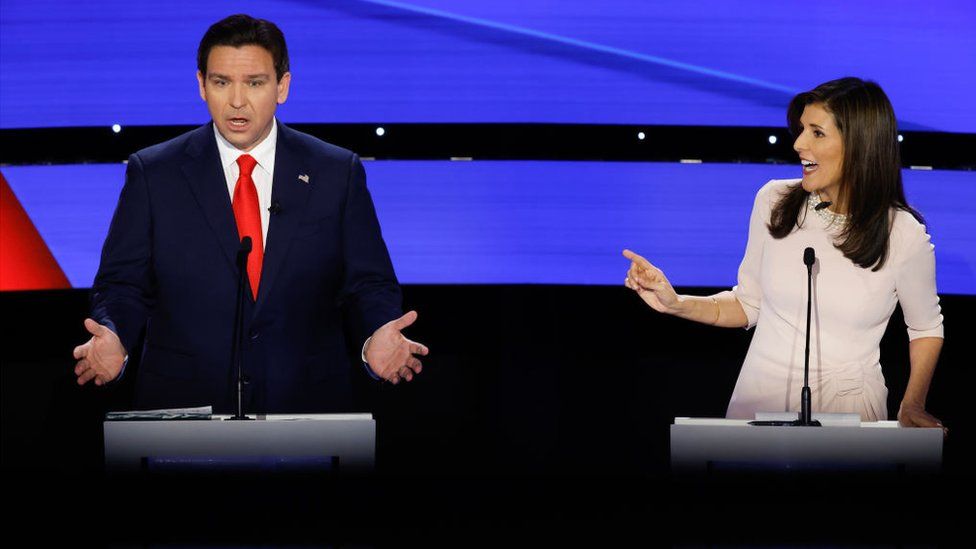
Long-time observers counter that Ms Haley has a knack for defying expectations.
“If you look at her career, a lot of people have underestimated her and a lot of people have been wrong,” said Randy Covington, a veteran journalist from South Carolina.
Even her critics acknowledge that she is a master of retail politics – the door-knocking and handshaking that delivered her to the statehouse in 2005. She stunned her own party in the primary by unseating Larry Koon, then the longest-serving member of the House. At the time, Ms Haley had no political experience and was a bookkeeper for her family’s clothing shop.
Nearly 20 years later, the state representative-turned-governor-turned-UN-ambassador still likes to introduce herself first as an accountant. She points out that she is a mom of two, the wife of a combat veteran and the child of Indian immigrants, running to make her family proud. In televised debates, in pancake houses and town halls, Ms Haley pauses mid-speech for a smile and pointed eye contact. She’s a down-home American hard at work for your vote.
“She connects, she has the X factor,” said David Wilkins, a former South Carolina House speaker who led Ms Haley’s transition to the governor’s house. “The more people who are exposed to her, the more support she’s going to get, it’s just that simple.”
Ms Haley’s campaign often looks and sounds like something out of 2012: more compromise and pragmatism, fewer grievances and conspiracy theories. She is a staunch conservative, but she speaks with nuance on hot button issues like abortion and immigration, and is less eager to wade into the country’s culture wars.
In Iowa this week, it was clear this was central to her appeal. Voters said they valued Ms Haley’s tone and her civility – a clear departure from Mr Trump, who spent part of this week in a federal appeals court for one of the four separate criminal cases he now faces.
“She’s boring,” one Iowan said of Ms Haley, before quickly clarifying he meant it as a compliment. “We need to get out of the era of politics that is dominated by what someone tweeted.”
Polls suggest Ms Haley’s measured approach could make her the most formidable opponent to President Joe Biden in November’s general election.
“Trump is head-to-head with Biden on a good day,” she said this week, before citing a Wall Street Journal poll from late last year. “I defeat Biden by 17 points.”
But she has to defeat Mr Trump first.
“This is still the party of Donald Trump, until the Republican party says otherwise,” said Jimmy Centers, an Iowa Republican political consultant.

At least one-third of Republican primary voters are thought to be in the “always Trump” camp – a group both devoted to the former president and repelled by the establishment politics embodied by Ms Haley.
“I think she’s just more of the same… and Trump isn’t,” said Mike Williams, an Iowa resident. “I want someone who’s a bit of an outsider.”
The vice-like grip Mr Trump has on the party doesn’t give Ms Haley much room for manoeuvre.
She needs to appeal to two very different groups of Republicans: the “never Trumpers” who despise the former president, as well as those who still like him but worry he will lose to Biden. She has to distance herself from him without alienating his supporters who might yet be persuaded to back someone else.
Ms Haley has been cautious in her criticism of her old boss. At a televised town hall in Iowa, a prospective backer sheepishly admitted he had voted for Mr Trump twice. “Me too,” she quipped, beaming.
In nearly every speech, she performs a tightly rehearsed juggling act. Mr Trump “was the “right president at the right time”, she’ll say. “But rightly or wrongly, chaos follows him”.
Those close to Ms Haley shot down the suggestion that she may eventually join his ticket as the vice-presidential nominee – something the Trump campaign has also dismissed. But Ms Haley has said yes to him before, when she became his ambassador at the United Nations.
Mr Trump, for his part, has turned his ire increasingly on Ms Haley, whom he dubbed “birdbrain” in September. “She is a globalist,” he said last week. “She likes the globe. I like America first.”
The escalating critiques are perhaps the clearest sign that the frontrunner is taking her campaign seriously. Some Trump aides have also been downplaying expectations of a blowout victory in Iowa.
The Republican race will not be decided this month. But the upcoming votes in Iowa and New Hampshire will be the first test of whether Mr Trump’s power is as strong as it seems. If not, Ms Haley will be waiting in the wings.
Related Topics
-
-
21 December 2023

-
-
-
29 November 2023
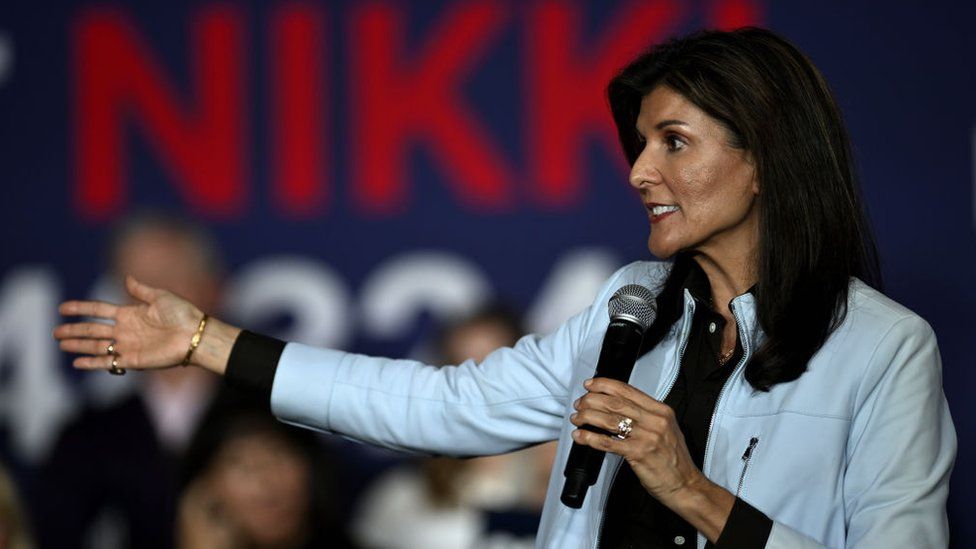
-
Commentary: Why it makes sense for Singapore to help protect the Red Sea

Moreover, most recently a grave new threat has emerged – that of a semi-submersible sea-based drone. These are particularly dangerous as they are very hard to see and destroy, and designed to hit its target at the waterline, its most vulnerable point.
Should such a drone strike a large container ship or oil or gas tanker, the damage could be catastrophic with ships sunk, crews killed and appalling environmental consequences.
ESCALATION IS A POOR ALTERNATIVE
Warship numbers and the schedules of individual shipping companies will not allow regular convoying for protection. So, Operation Prosperity Guardian will most likely be conducted by means of carefully chosen and patrolled shipping routes, with concentrations of naval forces in areas where the threat is considered to be at its highest.
Although this is a complex, demanding and expensive task, escalating the response may be a dangerous alternative.
With US and UK having launched first strikes against targets linked to the Houthis, any retaliatory action could endanger the precarious ceasefire in the Yemeni civil war and runs the risk of widening still further the conflict already engulfing part of the region.
So both by defending the trading system on which the whole world depends and trying to limit the dangers of an even greater war in the area, Operation Prosperity Guardian is an important exercise in the defence of global peace and prosperity.
Small states like Singapore can do their part too. As a small island state that depends on the global maritime system for its security and survival, Singapore must do what it can to support and uphold the multilateral rules-based system.
Geoffrey Till is Professor and Adviser to the Maritime Security Programme and Jane Chan is Senior Fellow and Coordinator of the Maritime Security Programme, at the S Rajaratnam School of International Studies (RSIS), Nanyang Technological University (NTU), Singapore.
Rising seas and warming weather threaten vulnerable native flora and fauna in Singapore

“It’s difficult for freshwater crabs to swim across the sea to Malaysia or Indonesia, so they are stuck here,” said NSS President Dr Yeo Seng Beng.
As the species does not exist anywhere else, it is also critically endangered globally and hence could easily go extinct.
“History won’t be kind to Singapore if we allow endemic species which only exist here to disappear,” he added.
Losing these habitats also puts other wildlife at risk of losing shorelines to breed, nest and feed, including the endangered hawksbill turtles that come in on the tides.
Migratory birds flying in for the summer, which make up about half of all birds found in Singapore, will also be affected.
They include the Eurasian Whimbrel, the Common Redshank and the Pacific Golden Plover, which are common visitors to the nation’s mudflats and coastal areas.
Taiwan Votes 2024: Beijing watches presidential race, dangling carrots for integration plans

Despite the criticisms, Mr Chen said he still found his experience studying in China invaluable.
He said that Taiwanese youths need more exposure in order to truly understand China, before passing judgement themselves.
The cross-strait integration plan unveiled by the Chinese State Council is part of China’s longstanding strategy to foster closer ties with Taiwan.
“We will suppress pro-Taiwan independence forces while using a soft approach towards the Taiwanese people,” Professor Li Fei from Xiamen University’s Taiwan Research Center told CNA.
“It is a carrot-and-stick approach. The carrot is to promote cross-strait integration and preferential policies for the Taiwanese.”
He added that despite many Taiwanese opposing reunification after seeing how Hong Kong is governed under the “One Country, Two Systems” principle, there is room for negotiation.
“The conditions for Taiwan’s ‘One Country, Two Systems’ may be discussed. ‘One Country’ is non-negotiable, but ‘Two Systems’ is negotiable. We are constantly adjusting and adapting it,” said Prof Li.
“We have to adapt it according to how we reunify with Taiwan. If it is a peaceful reunification, of course we can discuss the conditions. If it is a non-peaceful reunification, the system may be different.”
BETWEEN WAR AND PEACE
Beijing has framed the upcoming Taiwanese presidential contest as a choice between war and peace.
Bengaluru Kannada protests: Why English is a touchy topic in India’s Silicon Valley
 PTI
PTIIn the run-up to the New Year, the southern city of Bengaluru (formerly Bangalore) – often called India’s Silicon Valley for being home to global information-technology (IT) majors – hit the headlines after protesters tore down English billboards, demanding that they be written in the city’s local language, Kannada.
The Karnataka Rakshana Vedike’s (KRV) protest was to coerce the government to implement a law which mandates that 60% of each display sign in the city should have Kannada.
KRV got some support from India’s main political parties which condemned the violence but said there was no harm in demanding Kannada signages. A federal minister of the governing Bharatiya Janata Party (BJP) told a local news channel, “What is the harm in writing in Kannada, apart from English? This is not England”.
None of this came as a surprise because in India – home to more than 300 languages – assertion of linguistic identities is common. For instance, pro-Tamil language protesters in Karnataka’s neighbouring state Tamil Nadu have used the slogan “Tamil Nadu is for Tamils” since the 1930s.
After India won its independence in 1947, several states in the country were formed along linguistic lines by grouping together regions which spoke the same language. Karnataka was one such state formed in 1956.
KRV, which tore down the English billboards last month, has been claiming for decades that Kannada and its speakers have been relegated to the margins in the cosmopolitan city where people from across the country, and the world, work and live. In Bengaluru, four out of 10 people come from outside the city, reports say, although two-thirds of this population come from within the state.
While the influx of migrants has made some local people think that they would soon become a minority in the city, KRV’s “Kannada first” demand springs from a linguistic nationalism that has been in the making for decades. Cultural historian Janaki Nair says in a research paper that Kannada speakers first demanded a separate state in the 1920s.
Ms Nair notes that, at first, Kannada nationalists were accommodative of other languages, including English. One of the Kannada nationalists even said that “English is our cultural and political language, Sanskrit our spiritual and classical language and Kannada our native and speaking language”, she writes.

“In the beginning, this linguistic agitation was never muscular as it mainly asked for the development of the language and literature. Of late, vigorous protests have taken over the movement,” Kannada scholar Muzaffar Assadi told the BBC.
The strident protests started in the 1980s and before protesting against English, Kannada nationalists took on other Indian languages – Sanskrit, Tamil, Urdu and Hindi – scholars say.
The first of the vigorous protests was the Gokak agitation of 1982 which demanded that Kannada be made the sole first language in schools instead of Sanskrit. The Kannada film industry supported this protest, with superstar Rajkumar spearheading the movement.
This was followed by anti-Tamil riots of 1991 which gripped Bengaluru and Mysuru cities. The dispute was over sharing of water in the Cauvery river which courses through both the states. Neither Tamil speakers nor Kannada speakers wanted the other to have the larger water share.
Later, in 1996, major protests broke out when state broadcaster Doordarshan started programming in Urdu language. A decade later, in 2017, Kannada nationalists led by KRV, took on Hindi. The protesters demanded removal of Hindi from signages and public announcements on Bengaluru Metro line. “Namma Metro, Hindi Beda,” meaning ‘no Hindi in our Metro’ trended for days on social media.
Kannada nationalists started protesting against English only after India’s IT boom started in the 1990s and the demand for for English-speaking workers rose.
There was a general anxiety among many Kannadigas that English speakers from other states were taking away their jobs, and KRV started demanding the implementation of quotas or affirmative action for “sons of the soil”, as recommended by the Sarojini Mahishi committee of the 1980s.
KRV officials say they support regional languages over others as India’s federalism is rooted in regional autonomy and English signages get in the way of that. They add that they are not against multinational companies where English is crucial for work.
“We only think Kannada and its people should come first,” says Arun Javgal, organisational secretary of KRV, who works in the IT field himself.
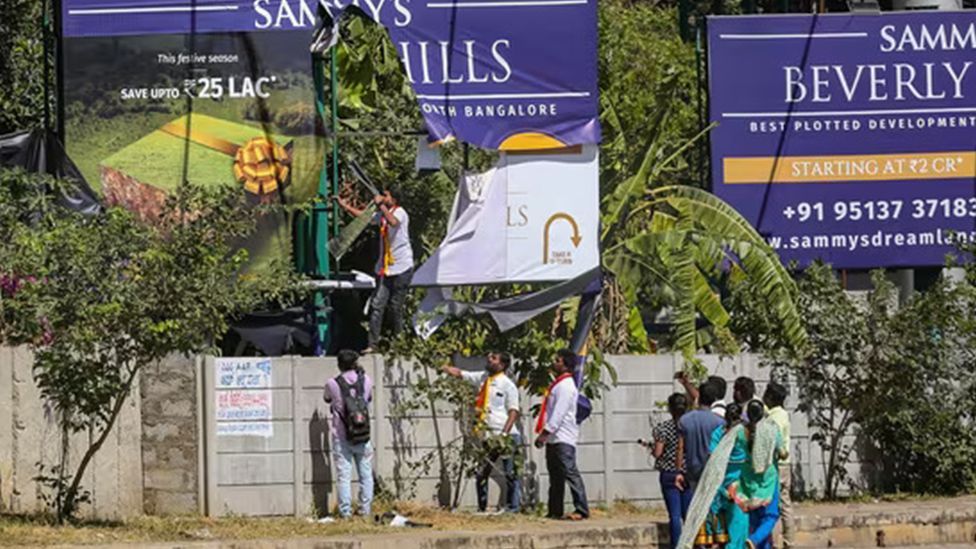
Most manifestations of Kannada nationalism, however, go unopposed in the state with a section of Kannada speakers fervently supporting KRV’s demands. Mr Javgal claims his organisation has a lot of support in the state, including in Bengaluru.
But can the recent protests and change in signages from English to Kannada affect brand Bengaluru’s global image? It will not, says Federation of Karnataka Chamber of Commerce and Industry (FKCCI), which represents commercial establishments in the state.
“It’s the diligent workforce of Bengaluru which built the brand and they would continue to do good work even if the signages change,” FKCCI president Ramesh Chandra says, adding that they have requested “commercial establishments to follow the law and use Kannada prominently in signages”.
The deadline for changing the signages is 28 February. As for KRV, its leaders say if European countries can have billboards in their local languages, so can Karnataka which has a population of 61.1 million, of which a majority are Kannada speakers.
BBC News India is now on YouTube. Click here to subscribe and watch our documentaries, explainers and features.

Read more India stories from the BBC:

-
-
3 September 2013
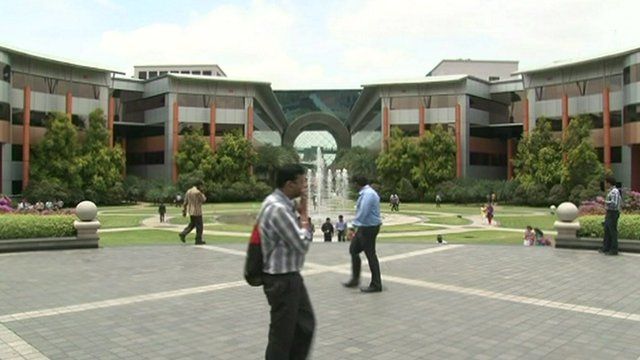
-
Heart of the Matter Podcast: If more hospital beds isn’t the solution, what is?
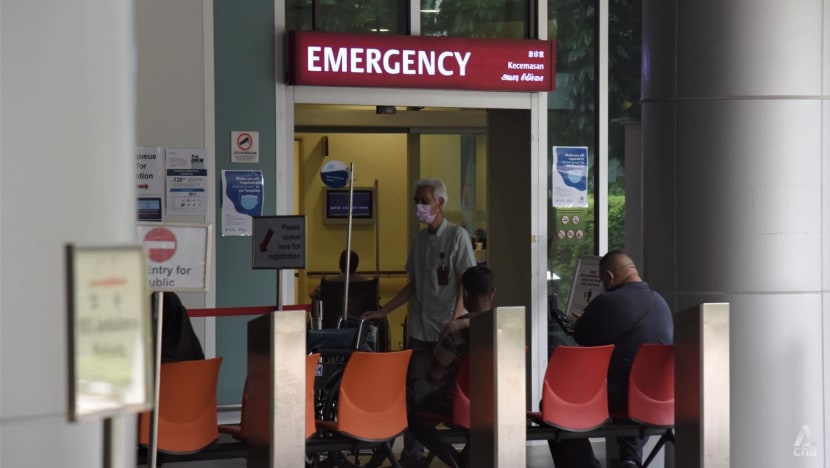
Patients have reported waiting for days to get a bed at a public hospital. Health experts say the biggest reason is that there are issues transiting to proper care after discharge.
Otelli Edwards speaks to public health specialist Dr Jeremy Lim, Duke-NUS Medical School’s Dr David Matchar and Jeremy Lee, assistant chief operating officer at the National University Hospital.
Whatâs a risk you took that youâre proud of? These women in Singapore share their inspiring stories

My youngest daughter Samirah was 16 when she was diagnosed with Crohn’s disease, a type of inflammatory bowel disease that can lead to abdominal pain, severe diarrhoea, fatigue and malnutrition. Due to this, she experienced severe stomach pain and was hospitalised often.
It was manageable when she was home, but difficult when she moved abroad. After her O Levels, Samirah enrolled in a pre-university institution in Kuala Lumpur (KL), Malaysia. When her condition flared up, I would take urgent leave, and my husband and I would drive up to KL to be by her side.
But when she went to Belfast, Northern Ireland, for her university degree, it got really tough. While the medical professionals there were more familiar with her condition and she received free medical treatment as a student, she struggled being alone.
Eventually, she fell into severe depression.
In March 2022, I had to make a decision: Stay in my teaching job or quit to take care of my daughter full-time in an unfamiliar country.
I had to consider my financial situation. Even though my other daughters, aged 28 and 27, were able to support themselves, it was tough to leave a stable income as my husband and I were both supporting our parents.
I also had to consider the responsibility I had as a teacher. I was teaching O-Level students then and to leave in April meant that I couldn’t guide them for the rest of the year.
But I knew being a mother was the biggest priority, so I took a risk and left the service.
After ensuring that matters would be cared for in our absence, my husband – who had decided to retire to be with Samirah – and I flew to Belfast to be with our daughter.
Since then, I’ve taken care of her, accompanying her to medical appointments, and supporting her.
Leaving my job and the rest of my family was a scary decision. I was aware that I’d lose my income – I didn’t know if we could survive on just our savings – and I wasn’t sure if Samirah would get better.
But I didn’t want to overthink it. I just knew that my daughter needed me and I had to be there for her.
Samirah graduated later that year and secured a research job in Newcastle, and we moved there with her. For her, I would risk it all over again.
KAVITHA KRISHNAN, ARTISTIC DIRECTOR, 52
The risk she took: She opened two dance companies that welcome people with disabilities.


